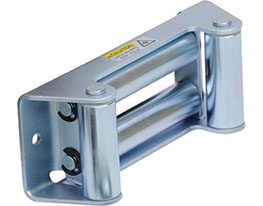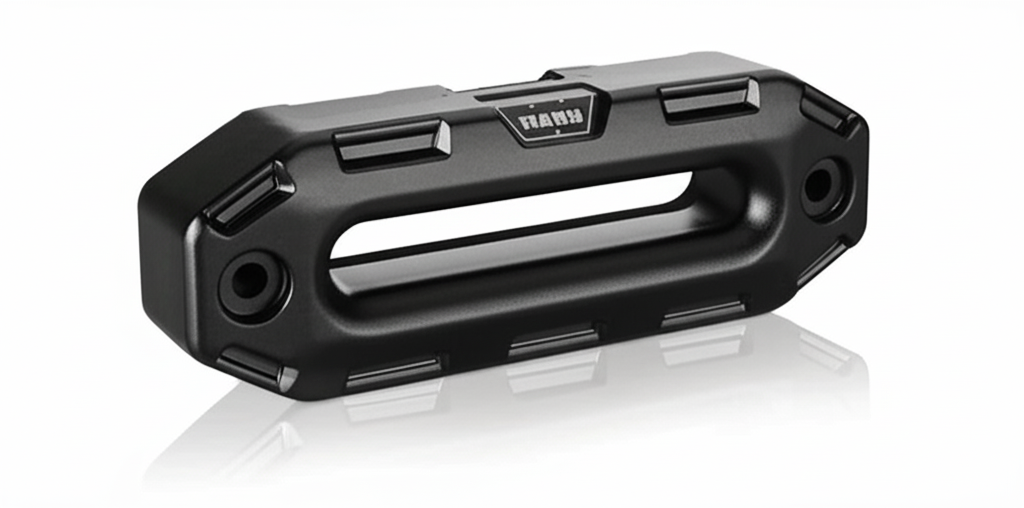When setting up a winch system for your off-road vehicle, one question that often comes up is: roller fairlead vs hawse which one should you choose? These two components play a crucial role in the performance and longevity of your winch line. They both help guide your cable or rope and reduce abrasion during pulls, but they’re suited for different setups and materials. In this blog, we’ll break down everything you need to know to help you make an informed decision for your vehicle.
What Is a Fairlead?
A fairlead is a guiding device mounted to your winch bumper or mounting plate. Its main job is to direct the winch line during operation and minimize wear. Whether you’re pulling straight on or at an angle, a good fairlead prevents the line from rubbing against sharp surfaces, which can cause serious damage over time.
There are two main types of fairleads:
- Roller Fairlead
- Hawse Fairlead
Each has its own design, benefits, and limitations, depending on whether you’re using a steel cable or a synthetic rope.
What Is a Roller Fairlead?
A roller fairlead consists of four metal rollers—two vertical and two horizontal—that help the winch line move smoothly during pulls. This type is commonly used with steel winch cables, especially in older or heavy-duty setups.
Advantages:
- Perfect for steel winch lines
- Handles angled pulls very well
- Reduces friction and line wear
- Offers smoother guiding action
Disadvantages:
- Not ideal for synthetic ropes—rollers can pinch or fray the fibers
- Bulkier than hawse fairleads
- Requires regular maintenance (rollers may seize or rust)
If you rely on a steel cable for strength and durability, a roller fairlead is the traditional and dependable option.
What Is a Hawse Fairlead?
A hawse fairlead is made from a single piece of aluminum or steel with a smooth, rounded opening. It’s specifically designed to guide synthetic winch ropes without snagging or fraying them.
Advantages:
- Lightweight and compact
- Ideal for synthetic ropes
- No moving parts minimal maintenance
- Sleek, low-profile design reduces chances of catching on obstacles
Disadvantages:
- Not compatible with steel cable
- Can cause more friction on angled pulls compared to rollers
Hawse fairleads are a modern solution for off-roaders who have switched to synthetic winch lines due to their safety and ease of use.
Roller vs Hawse: Which Should You Choose?
Choosing between a roller fairlead vs hawse depends mainly on what type of winch line you’re using and how you use your winch.
- Choose a Roller Fairlead if:
- You’re using steel cable
- You need to do frequent angled pulls
- Durability and strength are your top priorities
- Choose a Hawse Fairlead if:
- You’re running synthetic rope
- You want a lighter, cleaner-looking front end
- You prefer a maintenance-free solution
Don’t Forget: Cable Type Matters
Before deciding, make sure you’ve selected the right winch line. Steel cable is more abrasion-resistant and better for rugged, muddy, or rocky environments, but it’s heavier and can be dangerous if it snaps. Synthetic rope, on the other hand, is easier to handle and safer but more vulnerable to UV and sharp edges.
Roller fairleads pair best with steel cable, while hawse fairleads are built to support synthetic rope.
Final Thoughts: Roller Fairlead vs Hawse – Which One Wins?
Ultimately, the decision between roller fairlead vs hawse comes down to your gear and off-road needs. For maximum durability and steel cable users, a roller fairlead is still a great option. If you’ve embraced the benefits of synthetic winch ropes, a hawse fairlead is the safer and more efficient choice.
Looking to upgrade your recovery setup? Scorpion Truck Stuff carries a premium range of roller and hawse fairleads, winches, and accessories built for serious off-roaders. Whether you’re conquering trails or tackling tough recovery jobs, we’ve got the gear to back you up.



